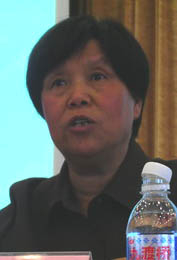By He Shan
China.org.cn staff reporter
The stimulus plan for the petrochemical industry will trigger a wave of industry restructuring, heralding a return to profitability for the industry, especially for the downstream refining sector, as oil prices drop to a seven-year low, Wang Yuying, formerly a senior manager with China Petroleum and Chemical Corporation (Sinopec), told China.org.cn on the sidelines of the annual session of CPPCC.
|

|
|
Wang Yuying |
"Sinopec faced unprecedented difficulties last year," she said. "Government subsidies and higher state-fixed fuel prices were not enough to offset record crude costs. But the losses haven't changed the fundamentals of the company."
Sinopec, Asia's biggest oil refiner, recently released a profit warning, saying 2008 earnings are likely to be half those of 2007.
"The difficulties are temporary. The price [of crude oil] has fallen to level at a seven-year low," she said.
PetroChina Co., Sinopec's biggest rival, also announced it expects this year's profit to be worse than last year as oil prices declined about 70 percent from the record US$147.47 a barrel reached in July last year. PetroChina is due to report its 2008 earnings on March 25.
A company engaged in upstream oil production, PetroChina has been hard affected by the nose-diving oil price.
But falling crude oil prices will help Sinopec to turn around its refining operations from a money loser to a profitable business this year.
Wang forecast that average crude oil prices in 2009 will be around US$40-50.
"Because Sinopec is less involved in exploring and developing crude oil than PetroChina, it is more vulnerable to price volatility," Wang said. "Now is a good time for Sinopec to buy energy companies in financial difficulties."
According to China's three-year energy plan, the government may tap its US$1.95 trillion foreign exchange reserves to set up an oil fund to help companies expand abroad, China National Petroleum, parent of PetroChina, said last month.
(China.org.cn March 9, 2009)